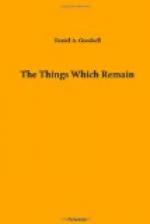[Sidenote: Among the Bees.]
[Sidenote: A Small Departure from Nature.]
The virgin queen bee produces males in abundance, but can not produce females until she has made her nuptial flight and met her mate in an embrace invariably fatal to him. Nor does she ever need to meet another. From that time on, she is the fruitful mother of every kind of bee life the hive needs; the undeveloped females called neuters and those who become queens by being fed on royal food. Virgin birth is therefore imbedded in nature’s order. To occur in the human species nature need call in no novelty. Christ, if born of a virgin, was born with the smallest possible departure from the order of nature. A process known in a lower form of life was carried into the higher to produce the unique being called for by the spiritual needs of mankind.
* * * * *
[Sidenote: The Historical Statement.]
Passing over the historical assertions which follow the doctrine of the virgin birth, “suffered under Pontius Pilate, was crucified, dead, and buried,” because there is nothing in these statements difficult or incredible, we reach the doctrine of His resurrection, “the third day He rose from the dead,” a doctrine next to that of the virgin birth in natural difficulty of acceptance.
[Sidenote: Christ’s Resurrection.]
[Sidenote: Surprise of Disciples.]
[Sidenote: The Fact Accounts for History.]
Faith in this seems to me to depend on how far we have accepted Christ’s Deity and His incarnation. If by the Holy Ghost we have been able “to say that Jesus is the Lord;” if by that blessed energy we perceive His Divine mastership; if by the same energy we feel that He has transformed us into the image of His dear Son; raising us “from the death of sin into the life of righteousness” it is not difficult to believe that Jesus “the power of the Resurrection” rose from the dead. “The fact of the Resurrection and belief in the fact is not explicable by any antecedent conditions apart from its truth."[5] The disciples did not expect what they saw. His death was for them so far as we can see, without hope. They were not able yet to interpret His prophecy that He would build again His temple, nor understand the spirituality of His kingdom. These facts seem to me utterly to demolish the theory of a vision called up by eager, yea, agonizing, expectation. The idea of the Resurrection justifies His prophecies as to Himself and the fact accounts, better than any theory which denies the fact, for the faith and founding of the early Church as well as for the course of subsequent history and of the believer’s experience.
[Footnote 5: Westcott. The Revelation of the Risen Lord.]
* * * * *
[Sidenote: Slow Belief in Resurrection.]
It is much to see that belief became belief only with great difficulty. The idea of the Resurrection was strange and alarming to the disciples. “They were terrified and affrighted and supposed they beheld a spirit.” Slowly by tests of sense as well as by persuasions of teaching did the disciples come to believe that the Christ of the Resurrection was the same Christ who suffered on the cross.




